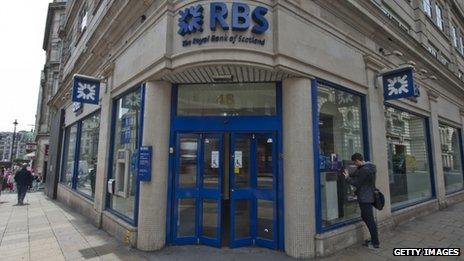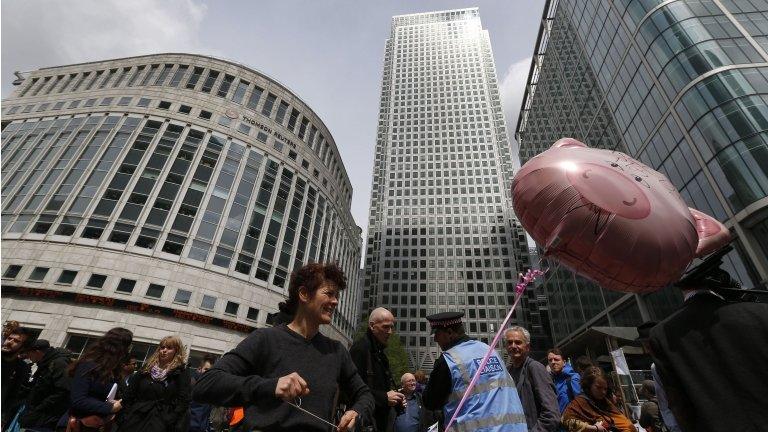The good, the bad and the ugly choices on banking
- Published

The commission has passed the RBS problem back to the government
You can license bankers, claw back bonuses for the bad ones, and jail the reckless ones. But what do you do about banks?
Westminster's Banking Standards Commission offers lots of analysis and strong recommendations about what to do with the culture of banking.
It's also got lots of analysis of what's wrong with the structure of the sector in Britain. There's not enough diversity, and competition is not effective, they say. No big surprise there. But the MPs and peers are far less clear about what to do to rectify that.
The Commission takes its closest look at what to do with Royal Bank of Scotland. And the signals coming from the panel's members ahead of publication were that that was what they found hardest to agree.
In the end, they agreed to hand it back to the government, requiring urgent work on how RBS could be split up and what the risks might be.
Fred the shredded
The analysis of RBS doesn't go back in so much detail to what went wrong before the autumn 2008 crunch, though the legacy of Fred Goodwin's buccaneering expansion, his dominance of RBS and its board, and his notorious pension, have gone a long way to explain the recommendations for tackling reckless bankers and improving governance.

The government ensured that Stephen Hester did not receive his full bonus
The report recognises the efforts of Stephen Hester, RBS's chief executive, to clear up the mess. And it's critical of the government for the extent of interference in running the Royal Bank.
Most obviously by forcing Stephen Hester not to take his bonus, under media and public pressure, the government is seen as having run roughshod over its own arm's length arrangements.
This made UK Financial Investments, which, in a "sensible" arrangement, has represented the taxpayers' shareholding, merely "a figleaf to disguise the reality of direct government control".
This, it is concluded, has not been acceptable, and the arrangements cannot continue. The figleaf should go, UKFI should be wound up, and the shares should be controlled directly from the Treasury.
Splitting options
And what then? The strong hints around the recent announcement that Stephen Hester is to quit RBS suggest political pressure to get on with a sale ahead of the 2015 election.
But the Commission has failed to offer the government much help in how to go about that. It split on the question of whether to split good assets, which could more easily be sold off, from bad. The bad bank option, putting them in a toxic vault controlled by government, has been used in the USA, in Ireland and in Switzerland. It was used on Northern Rock, though that was a very much simpler beast.
There is a strong case, with the benefit of hindsight, that such a split might have been the best thing to do back in 2008-09. What that forgets is that it would have involved much higher risks than the Government then took on with its bail-out option. Anyway, it's much less clear that it works for circumstances now.
And that's just one of several options the Commission looks at for RBS, which only serve to underline how difficult it is to change the recovery course that the Royal Bank has been on since early 2009.
If you split it into good and bad, are you at risk of simply returning a giant back to a dysfunctional market of giants, or should there be a further division of the good bank into either national units with particular niches, or into banks with regional strengths. Could there, for instance, be a business bank as a legacy from RBS along with a separate retail bank?
Risky business
What to do about its investment bank, where you find the big risks, the huge returns and the giant losses? Although it's being forcibly and painfully slimmed down, Stephen Hester argued to Commission members that RBS has to stay active in that risky end of banking in order to be able to provide a full range of banking services to its customers.
None of these are easy options, least of all when the Commission considered the problems of making them happen. Some 19% of RBS shares are not in government hands. As it turns out that the government has no powers to nationalise that minority stake, it may be tricky and expensive to incentivise owners of those shares to part with them.
And how do you identify what's a good from a bad asset. Loans don't start sour, but they can turn that way. So at what point should they be put on the 'bad bank' side of the ledger?
How about the risk to the government of taking on all those bad bank assets, without the strength of the good bank to trade out of trouble? That's a new load on the government balance sheet, which it can ill afford. And would it be allowed to, under European state aid rules?
All of this, it is pointed out, can take quite a bit of time. Finding buyers for assets has not been easy for either RBS or Lloyds, when trying to flog off portions of their operations as required by the European Commission. Nor has it been cheap. Lloyds Banking Group has spent roughly £1bn on the process, it says.
Lots of options, but no clear direction. We're not much further forward in setting out how the structure of British banking might look different in future.
And buried in all those volumes of recommendations and evidence is one interesting section that could be a significant part of the cure. 'Financial literacy' is flagged up as a problem. Too many customers don't understand banks and they don't understand money.
It's one thing to get more competitive banks and better controlled bankers. But the other side of the recovery process is to get smarter customers.
- Published19 June 2013
